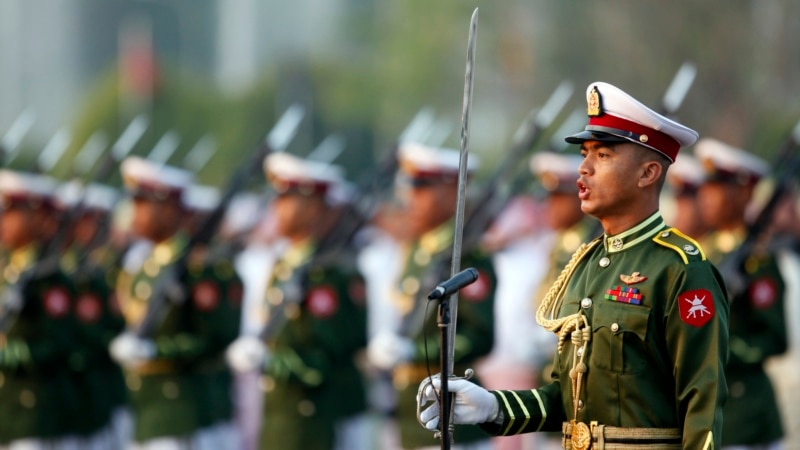Myanmar Satirist Fears More Charges

Myanmar writer and satirist Kyaw Swa Naing thinks the police could come back for him any day now.
"If it happens, I am already prepared,†the 30-year-old said in an interview with VOA at his home in Yangon. “I am not worrying too much because I have already been in jail for 14 days [recently]. But I am worried about my family because I am the only breadwinner.â€
Under the pen name “Britisher Ko Ko Maung,†Kyaw Swa Naing has been writing satirical pieces in Burmese publications since 2012, soon after Myanmar lifted decades-old censorship laws put in place during military rule.
He has never had any problems, he said, but that changed in March, when his employer, the Voice daily newspaper, published a piece of his entitled “Allegiance to the Republic of the Upright Bullet.â€
Labeled “satire†at the top of the headline, the essay casts Myanmar’s long history of civil war in darkly comical terms.
“Under careful analysis, I suppose we are genuinely united, truly patriotic. So united that we don’t pick fights with foreign nations; we only smack and slug one another, going around and around,†he wrote, according to an English-language version by San Francisco-based Burmese translator Kenneth Wong.
“The rest of the worldâ€"when America went to war with Iraq and Afghanistan, their soldiers had to go across land and sea to reach the battle zone. Here, we take it easy. To go to battle, we travel by car for about a day, and suddenly there we are! At the front line! Free to fire at will!â€
He also refers to several violent incidents in recent history, and ends by suggesting that the “bullet-riddled, bomb-whizzed Union of ours†change its name to the Republic of the Upright Bullet, concluding with “ahem, ahem, just kidding OK?â€
The military did not get the joke.
The newspaper published an apology, but Kyaw Swa Naing and the editor, Kyaw Min Swe, were arrested in June after a military officer filed a complaint against them. They were charged under article 66d, a controversial law criminalizing online defamation that carries a maximum three-year prison sentence.
Scores of activists, writers, media professionals and ordinary citizens have faced the same charge since Aung San Suu Kyi’s National League for Democracy (NLD) won landmark elections in 2015. Many cases involve criticism of senior NLD officials. While amendments to the law are currently under consideration in parliament, advocates say they don’t go far enough.
After being arrested, Kyaw Swa Naing spent two weeks in jail, but the court dropped the charges against him and let him go, saying the editor bore responsibility. Far from feeling relieved, however, Kyaw Swa Naing was racked with guilt.
“I wrote this satire. But…Kyaw Min Swe and I were in jail. I was sad. He has two children. When I was released, I felt like I left him and ran away,†he said. “I was just released according to the law. But I was feeling so hurt that night. I even cried. He has a wife and two kids. We were in jail for 14 days together. The two of us became close.â€
His wife was pregnant before the arrest but the trauma over the ordeal caused complications with the pregnancy and she lost the baby, he said.
"So I worry about her health."
The problems are not over. He said the police informed him that an additional complaint has been filed, which could lead to a new trial.
Colonel Lin Tun, who filed the original complaint against the pair, told a court last week that satire should not hurt the country’s unity, and that the article could create tensions in army ranks.
Kyaw Swa Naing said this isn’t true and that he didn’t single out the army, known in Burmese as the Tatmadaw. The piece was inspired by a pro-military movie, but Kyaw Swa Naing said writers should be allowed to freely satirize films.
He said he will continue to write but the case has made him wary of certain topics.
“Writing is my professional career so I can’t stop it. And I want to write a satire if I see something wrong. And I am still writing satire now,†he said. “But I have to control myself when I am writing about the Tatmadaw because they are watching me and I feel insecure. I will write for sure and I am writing now. We will have to fight for freedom of expression like we did [in the past].â€
He is worried, however, that future generations of writers will self-censor.
“It is dangerous for the country. I think democracy means working transparently with government and people,†he said.
“Journalists are those who light up the space between the government and people. It is like the [light] bulbs were hit by stones and I am afraid the next bulbs will not light up. I am afraid the next generation writers will be afraid to write.â€

0 Response to "Myanmar Satirist Fears More Charges"
Posting Komentar